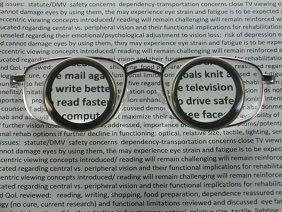Philosophers have been trying to reconcile the subject and object duality as long as there’s been philosophy. A recent fad in this vein is called ‘binocularity.’ It only confuses the issue even more.
 Proponents of binocularity say things like, “being able see ourselves though two fundamentally different lenses, as both objects and subjects, and integrate those two sources of information, can give us a greater depth of understanding of ourselves.”
Proponents of binocularity say things like, “being able see ourselves though two fundamentally different lenses, as both objects and subjects, and integrate those two sources of information, can give us a greater depth of understanding of ourselves.”
This is what’s known as begging the question. Who or what is doing the seeing, and the integrating? There is still the separate observer—a ‘me’ camouflaged in that innocuous-sounding word ‘us,’ which claims to ‘integrate the two sources of information.’
The correct answer as to whether we are subjects or objects is not both; it is neither. The object is the subject and the subject is the object. There can’t be one without the other, because both are the product of the separative, dualistic mind. To see oneself or anything clearly, that rock-bottom dualism has to end.
Dualism can only end if thought falls silent however. And thought falls silent when the infinite regression of the observer ceases in passive awareness gathering into active (though undirected) attention.
Shifting back and forth between subject and object is likened to viewing Wittgenstein’s duck/rabbit silhouette. Are we a duck (subject) or a rabbit (object)? It’s a ridiculously wrong question and analogy.
Making the effort to see oneself as a subject one moment and an object the next still requires an entity that makes the effort. When the subject/object duality drops away however, there is no entity and no effort, because there’s no separation, ego and will.
Passively observing the primal habit of psychological separation, the brain catches the mind (as thought) in the act of separating itself from itself. At that moment, the infinite regression stops, and there is just the brain observing. Space opens between thoughts, and the entire mechanism, which we mistakenly call the mind, falls silent.
Meditation, or whatever name wants to give to this process, can therefore be defined as allowing the observing capacity of the brain to grow quicker than the separating capability of thought.
quicker than the separating capability of thought.
How? There is no method, because all methods are fabricated by thought and applied by the illusorily separate observer/self. But there is an approach and an art, and that is to simply watch the movement of thought, in the mirror of nature preferably, and let awareness quicken and gather into unwilled and undirected attention.
There is no effort, direction, or will in this process, because there is no control. Awareness and attention are not a matter of choice and control. We cannot choose to be aware; we can only choose to be unaware, and that makes us dumb and numb.
Some thinkers believe that “he experience I have as a subject with a mind is as real a feature of the world as is the body that is the necessary condition for that experience.” This idea simply is false.
Philosophers, like everyone else, can’t have it both ways. Either the concept of free will is correct, and we “can generate spontaneous choices and actions not determined by prior events;” or “the neural basis of behavior” is correct, and “our experiences or movements are determined by an infinitely long chain of natural and social forces.”
The right approach to the dualistic dilemma of being human is not binocularity, but negation. Taking 10 or 15 minutes in the morning and evening to passively observe the movement of one’s mind and emotions, awareness quickens and attention gathers.
A movement of negation begins, which orders and quiets the mind, bringing peace and insight. (A movement of negation begins the moment psychological time ends in undirected attention to the whole movement of thought/emotion.)
Thus the brain deletes its useless files of psychological memory—the stuff that makes up the ‘me,’ suffocating the spirit and stultifying the brain. When the awareness of the brain catches the mind-as-thought in the act of separating itself from itself as the observer/self, the wholeness of being and life return, and the brain and body are renewed.
So it’s deeply misleading to say “to understand ourselves in depth, we need to see ourselves as both subjects and objects.” To understand and liberate ourselves at depth we need to awaken the brain’s capacity to see without the subject/object duality.
If there is no such thing as free will, and choosing is always based on the conditioning of the mind and brain “determined by an infinitely long chain of natural and social forces,” then is there such a thing as responsibility?
Paradoxically, it is only in the negation of the observer/me that responsibility has any true meaning. Since there is no separate entity that is responsible, there is just the phenomenon and action of responsibility for the entirety of content-consciousness within oneself.
The separate, choosing self cannot be responsible, because it doesn’t actually exist. Responsibility begins with observation without the delusion of the observer and chooser. That alone ends the illusion of independent me, and the ineluctable and insufferable acting out from it.
Martin LeFevre

